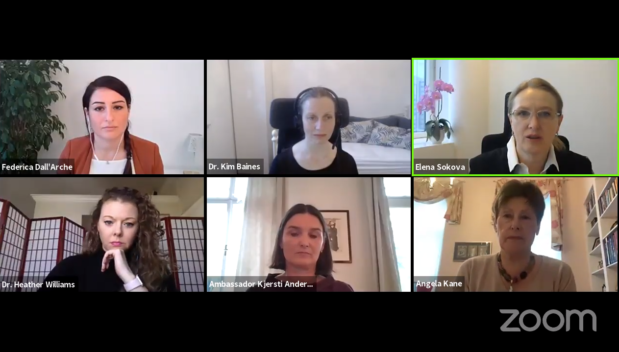
The International Affairs Institute (IAI) and the Vienna Center for Disarmament and Non‑Proliferation (VCDNP) in the framework of the EU Non-Proliferation and Disarmament Consortium (EUNPDC) have launched the Young Women and Next Generation Initiative (YWNGI) to encourage young women and the next generation to enter the non‑proliferation, arms control and disarmament field.
Inspired by the widely perceived age and gender imbalances among experts and practitioners in the non-proliferation, arms control and disarmament field, the Young Women and Next Generation Initiative (YWNGI) aims to help address such imbalances by exposing college and university level students, especially women, to arms control issues, increasing their awareness of them and encouraging their participation in events and workshops. The goal is to help students understand how to pursue a career in the field, making the best use of their own skills.
The Initiative will include the organisation of outreach events, the establishment of a mentorship programme, and the convening of workshops and meetings.
Meet the YWNGI Advisory Board !
For more information, please visit IAI and VCDNP‘s dedicated webpages on the Initiative.
Should you have any questions, please feel free to contact eunpdc@iai.it.
Young Women in Non-proliferation and Disarmament Mentorship programme
A Young Women in Non-Proliferation and Disarmament (YWNPD) Mentorship Programme has been created under the Young Women and Next Generation Initiative (YWNGI), in the framework of the EUNPDC.
Next Generation Workshops
The Next-Generation Workshops will focus on the development of ‘next generation’ specialists, including from countries outside Europe and North America, who will be invited to an extra day before or after the annual conference for specialised training and exposure to relevant EU institutions.
There are no upcoming events at this time.
Notice: Trying to access array offset on value of type bool in /home/agnifrqvwr/frs/wp-content/plugins/the-events-calendar-templates-and-shortcode/templates/list-template.php on line 14
Notice: Trying to access array offset on value of type bool in /home/agnifrqvwr/frs/wp-content/plugins/the-events-calendar-templates-and-shortcode/templates/list-template.php on line 14
Notice: Trying to access array offset on value of type bool in /home/agnifrqvwr/frs/wp-content/plugins/the-events-calendar-templates-and-shortcode/templates/list-template.php on line 14
Notice: Trying to access array offset on value of type bool in /home/agnifrqvwr/frs/wp-content/plugins/the-events-calendar-templates-and-shortcode/templates/list-template.php on line 14
OUTREACH EVENTS
There are no upcoming events at this time.
Webinar: “Conventional Weapons Diversion: Challenges and Initiatives to Counter Illicit Trafficking”
The Vienna Center for Disarmament and Non-Proliferation (VCDNP) and the International Affairs Institute (IAI), in the framework of the Young Women and Next Generation Initiative (YWNGI) cordially invite you to […]
Find out more »Tentative agenda
16.00: Welcome remarks and introduction Federica Dall’Arche, Senior Research Associate, VCDNP Speaker Nils Duquet, Director, Flemish Peace Institute 17.15 Q&A 17.45 Meeting EndsBackground
The Vienna Center for Disarmament and Non-Proliferation (VCDNP) and The International Affairs Institute (IAI), in the framework of the EU Non-Proliferation and Disarmament (EUNPD) Consortium have launched a Young Women and Next Generation Initiative (YWNGI), an initiative to encourage young women and the next generation to enter the non-proliferation, arms control and disarmament field. Driven by the widely shared awareness of the persistent age and gender imbalances among experts and practitioners in the non-proliferation, arms control and disarmament field, the Young Women and Next Generation Initiative aims to help address such imbalances by exposing college and university level students to arms control issues, increasing awareness and encouraging participation in events and workshops. The initiative also aims to respond to the very limited offering of relevant courses on WMD issues in colleges and universities at undergraduate and master’s level. The goal is to help students understand how to pursue a career in the field, making the best use of their own skills. The Initiative includes the creation of a mentorship programme, the conveying of workshops and meetings, and the organization of outreach visits at universities. The YWNGI is possible thanks to the generous support of the European Union. Download the PDFConventional Weapons Diversion and Young Women and Next Generation Initiative (YWNGI) Mentorship Alumni Regional Meeting in Brussels
The Vienna Center for Disarmament and Non-Proliferation (VCDNP and the International Affairs Institute (IAI), on behalf of the EU Non-Proliferation Consortium and in the framework of the Young Women Next Generation Initiative (YWNGI) organized the first Mentorship Alumni meeting in Brussels and a webinar on Conventional Weapons Diversion featuring Dr. Nils Duquet.
Find out more » Participants in the Alumni Regional Meeting[/caption]
The meeting brought together mentors and mentees based in Brussels and surrounding areas, representing both current and past cohorts of the YWNGI Mentorship Programme. This format enabled participants to engage in in-person discussions, share experiences, and strengthen their network, while reflecting on the four editions of the Mentorship Programme.
[caption id="attachment_14360" align="alignnone" width="411"]
Participants in the Alumni Regional Meeting[/caption]
The meeting brought together mentors and mentees based in Brussels and surrounding areas, representing both current and past cohorts of the YWNGI Mentorship Programme. This format enabled participants to engage in in-person discussions, share experiences, and strengthen their network, while reflecting on the four editions of the Mentorship Programme.
[caption id="attachment_14360" align="alignnone" width="411"] Selected Mentees at the Alumni Regional meeting[/caption]
The event was opened by Ettore Greco, Executive Vice-President at IAI, who spoke about the origins of the Mentorship Programme, its goals and challenges, and emphasized the importance of in-person meetings as a way to gather inputs from participants and strengthen their network and sense of community. He also moderated remarks delivered by Pedro Arostegui, Chair of the Council’s Working Group on Non-Proliferation at the EEAS, Sibylle Bauer, Director of Studies, Armament and Disarmament at SIPRI and Chair of the EUNPDC, and Nils Duquet, Director at the Flemish Peace Institute.
[caption id="attachment_14361" align="alignnone" width="900"]
Selected Mentees at the Alumni Regional meeting[/caption]
The event was opened by Ettore Greco, Executive Vice-President at IAI, who spoke about the origins of the Mentorship Programme, its goals and challenges, and emphasized the importance of in-person meetings as a way to gather inputs from participants and strengthen their network and sense of community. He also moderated remarks delivered by Pedro Arostegui, Chair of the Council’s Working Group on Non-Proliferation at the EEAS, Sibylle Bauer, Director of Studies, Armament and Disarmament at SIPRI and Chair of the EUNPDC, and Nils Duquet, Director at the Flemish Peace Institute.
[caption id="attachment_14361" align="alignnone" width="900"] From left to right: Ettore Greco, Sibylle Bauer, Pedro Arostegui, Nils Duquet[/caption]
Pedro Arostegui highlighted the core belief behind the programme: that the voices, insights, and ideas of young women are essential in addressing today’s global challenges. He emphasized that this belief is central to the European Union’s approach, which acknowledges that collective security relies not only on policies and institutions but also on the strength of people-to-people networks — such as those built through the Young Women and Next Generation Initiative and its Mentorship Programme.
From left to right: Ettore Greco, Sibylle Bauer, Pedro Arostegui, Nils Duquet[/caption]
Pedro Arostegui highlighted the core belief behind the programme: that the voices, insights, and ideas of young women are essential in addressing today’s global challenges. He emphasized that this belief is central to the European Union’s approach, which acknowledges that collective security relies not only on policies and institutions but also on the strength of people-to-people networks — such as those built through the Young Women and Next Generation Initiative and its Mentorship Programme.
Empowering youth - especially young women - is not just the right thing to do, but a strategic imperative for building resilient, inclusive security frameworks". "The EU is proud to support initiatives like the Young Women and Next Generation Initiative —and to see how it has grown from a pilot project into a growing community of young female experts and future leaders.Sibylle Bauer and Nils Duquet, both mentors and Advisory Board members since the programme’s inception, shared their perspectives on its evolution. They underscored how the initiative has grown into a vibrant and expanding community and reaffirmed their strong support for its mission. As the programme enters its fourth edition, the speakers expressed keen interest in understanding the impact it has had on mentees. [caption id="attachment_14362" align="alignnone" width="1128"]
 From left to right: Ksenija Trajkovska, Bianca Voican, Fer Avar, Amanda Narhan Pereira, Karen Van Loom, Precious Eze[/caption]
The event continued with a Roundtable discussion among mentors and mentees, moderated by Paola Tessari, Senior Fellow at IAI. After brief introductions, mentees reflected on their experiences in the programme and how it shaped their professional aspirations. For some, it sparked new areas of interest; for others, it expanded their knowledge of the field. All mentees emphasized the value of the relationships formed: from professional networking and participation in high-level conferences to lasting personal connections and friendships. The roundtable also featured suggestions for improving the programme and highlighted the importance of fostering connections across different cohorts to strengthen the growing community.
[caption id="attachment_14363" align="alignnone" width="1141"]
From left to right: Ksenija Trajkovska, Bianca Voican, Fer Avar, Amanda Narhan Pereira, Karen Van Loom, Precious Eze[/caption]
The event continued with a Roundtable discussion among mentors and mentees, moderated by Paola Tessari, Senior Fellow at IAI. After brief introductions, mentees reflected on their experiences in the programme and how it shaped their professional aspirations. For some, it sparked new areas of interest; for others, it expanded their knowledge of the field. All mentees emphasized the value of the relationships formed: from professional networking and participation in high-level conferences to lasting personal connections and friendships. The roundtable also featured suggestions for improving the programme and highlighted the importance of fostering connections across different cohorts to strengthen the growing community.
[caption id="attachment_14363" align="alignnone" width="1141"] From left to right: Ettore Greco, Federica Dall’Arche, Nils Duquet[/caption]
The regional meeting also featured a hybrid lecture by Dr. Nils Duquet, moderated by Federica Dall’Arche, Senior Associate at the VCDNP. Dr. Duquet addressed the issue of conventional weapons diversion, explaining how legally traded arms can be diverted into illicit markets throughout their lifecycle.
He outlined international normative frameworks and initiatives aimed at curbing the illicit proliferation of such weapons and discussed the involvement of non-state actors — including religious extremists and far-right groups. Duquet also explored how emerging technologies, such as 3D printing, are being used to manufacture firearms and how arms trafficking has fuelled both past and ongoing conflicts. The lecture concluded with an interactive Q&A session.
The VCDNP and IAI warmly thank the Flemish Peace Institute for hosting the event and the European Union for the generous support in making this event possible.
The event was organized under the frameworks of the YWNGI, an initiative by the VCDNP and IAI on behalf of the EU Non-Proliferation and Disarmament Consortium (EUNPDC), which aims to inspire young women and the next generation to explore careers in non-proliferation, arms control, and disarmament. The initiative provides mentorship, workshops, and outreach opportunities to address gender and age imbalances in the field.
More information about the Young Women and Next Generation Initiative (YWNGI) and the Mentorship Programme can be found below:
Mentorship Programme https://vcdnp.org/mentorship/
Young Women and Next Generation Initiative https://vcdnp.org/young-women-and-next-generation-initiative-ywngi/
From left to right: Ettore Greco, Federica Dall’Arche, Nils Duquet[/caption]
The regional meeting also featured a hybrid lecture by Dr. Nils Duquet, moderated by Federica Dall’Arche, Senior Associate at the VCDNP. Dr. Duquet addressed the issue of conventional weapons diversion, explaining how legally traded arms can be diverted into illicit markets throughout their lifecycle.
He outlined international normative frameworks and initiatives aimed at curbing the illicit proliferation of such weapons and discussed the involvement of non-state actors — including religious extremists and far-right groups. Duquet also explored how emerging technologies, such as 3D printing, are being used to manufacture firearms and how arms trafficking has fuelled both past and ongoing conflicts. The lecture concluded with an interactive Q&A session.
The VCDNP and IAI warmly thank the Flemish Peace Institute for hosting the event and the European Union for the generous support in making this event possible.
The event was organized under the frameworks of the YWNGI, an initiative by the VCDNP and IAI on behalf of the EU Non-Proliferation and Disarmament Consortium (EUNPDC), which aims to inspire young women and the next generation to explore careers in non-proliferation, arms control, and disarmament. The initiative provides mentorship, workshops, and outreach opportunities to address gender and age imbalances in the field.
More information about the Young Women and Next Generation Initiative (YWNGI) and the Mentorship Programme can be found below:
Mentorship Programme https://vcdnp.org/mentorship/
Young Women and Next Generation Initiative https://vcdnp.org/young-women-and-next-generation-initiative-ywngi/
Additional Resources:
Opening Statement by the EEAS Recording of the Event Agenda of the eventSecuring Our Future: an Introduction To Arms Control, Non- Proliferation, And Disarmament at the University of Split
The Vienna Center for Disarmament and Non-Proliferation (VCDNP) and the International Affairs Institute (IAI), on behalf of the EU Non-Proliferation Consortium and in the framework of the Young Women Next Generation Initiative (YWNGI) visited the University of Split to engage the next generation and raise awareness on non-proliferation, disarmament, and arms control issues.
Find out more »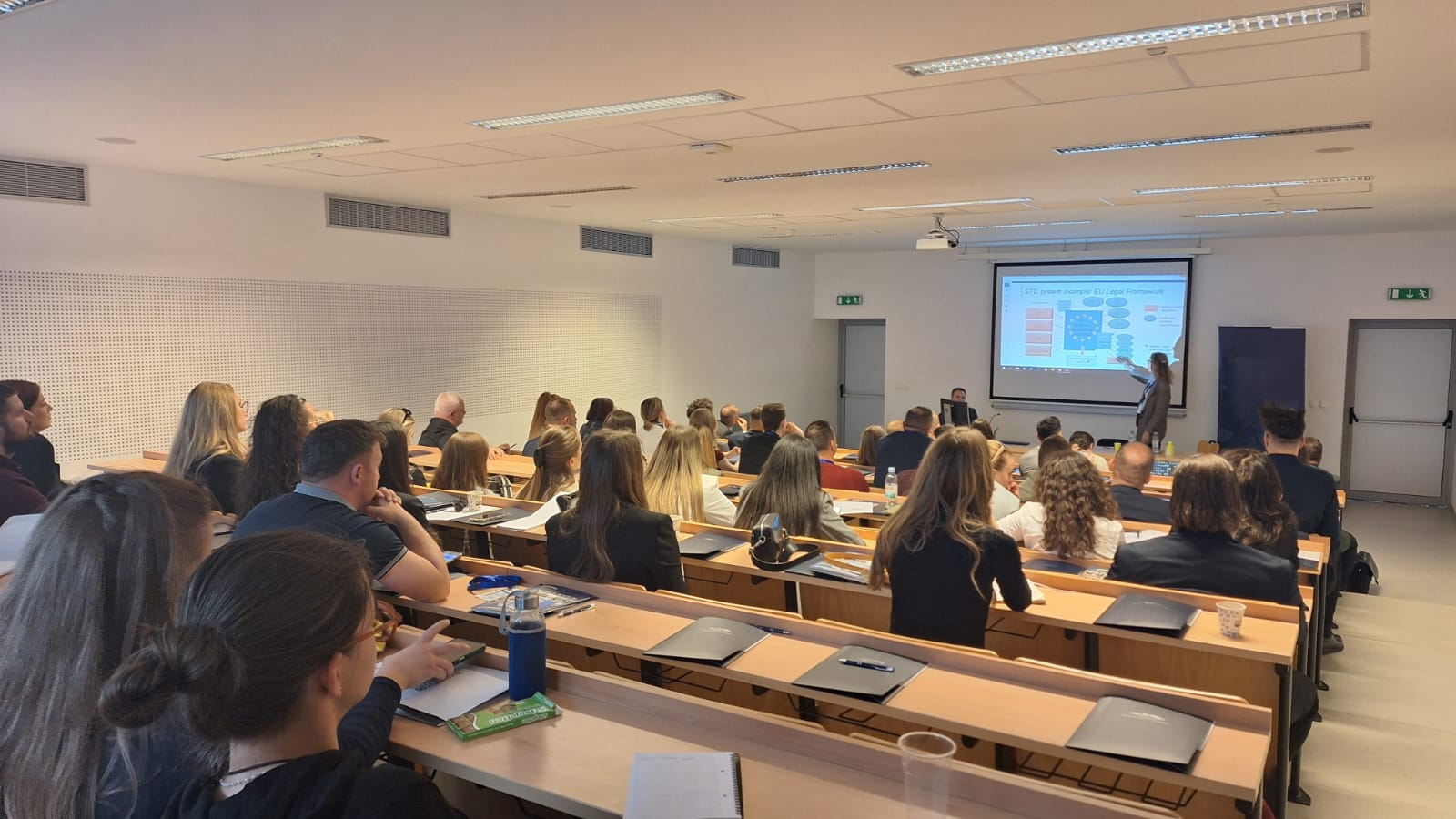 Prof. Sanchez Cobaleda (University of Barcelona) presenting on Dual Use and Export Control[/caption]
From 9 to 10 April 2025, the VCDNP and IAI visited the University of Split and took part in the “Securing Our Future: An Introduction to Arms Control, Non-Proliferation, and Disarmament” workshop. The workshop brought together selected students from across the South East European region, including from the University of Zagreb and the University of Budapest. The workshop was also open to the general public and included the participation of young professionals, experts, diplomats, and officers.
The two-day event, which provided attendees with a foundational understanding of arms control, non-proliferation, and disarmament by covering political, legal, and technical dimensions of international security frameworks, was an opportunity for the VCDNP and IAI to represent the EU Non-Proliferation and Disarmament Consortium (EUNPDC) and to present its work and activities.
Welcome remarks were delivered by Prof. Damir Piplica, Head of the Department of Forensic Sciences at the University of Split, who warmly greeted participants and speakers and officially opened the event. The first day featured expert-led lectures and discussions focused on foundational topics in arms control and non-proliferation and disarmament.
Ms. Federica Dall’Arche, Senior Research Associate (VCDNP), introduced participants to the EUNPDC, outlining its role and activities, particularly those targeting the younger generation of experts, such as the Young Women and Next Generation Initiative, the Next Generation workshop and the EUNPDC Internships. Ms. Dall’Arche also offered an overview of the different free educational resources offered by the Consortium, including e-learning courses and policy papers, among others.
[caption id="attachment_14369" align="alignnone" width="920"]
Prof. Sanchez Cobaleda (University of Barcelona) presenting on Dual Use and Export Control[/caption]
From 9 to 10 April 2025, the VCDNP and IAI visited the University of Split and took part in the “Securing Our Future: An Introduction to Arms Control, Non-Proliferation, and Disarmament” workshop. The workshop brought together selected students from across the South East European region, including from the University of Zagreb and the University of Budapest. The workshop was also open to the general public and included the participation of young professionals, experts, diplomats, and officers.
The two-day event, which provided attendees with a foundational understanding of arms control, non-proliferation, and disarmament by covering political, legal, and technical dimensions of international security frameworks, was an opportunity for the VCDNP and IAI to represent the EU Non-Proliferation and Disarmament Consortium (EUNPDC) and to present its work and activities.
Welcome remarks were delivered by Prof. Damir Piplica, Head of the Department of Forensic Sciences at the University of Split, who warmly greeted participants and speakers and officially opened the event. The first day featured expert-led lectures and discussions focused on foundational topics in arms control and non-proliferation and disarmament.
Ms. Federica Dall’Arche, Senior Research Associate (VCDNP), introduced participants to the EUNPDC, outlining its role and activities, particularly those targeting the younger generation of experts, such as the Young Women and Next Generation Initiative, the Next Generation workshop and the EUNPDC Internships. Ms. Dall’Arche also offered an overview of the different free educational resources offered by the Consortium, including e-learning courses and policy papers, among others.
[caption id="attachment_14369" align="alignnone" width="920"] Federica Dall’Arche (VCDNP) presenting the EUNPDC[/caption]
The morning continued with a lecture on conventional arms control delivered by Col (res.) László Szatmári, former Head of the Hungarian Military Advisory Group to the OSCE. He provided an in-depth analysis of key conventional arms control agreements, including the Conventional Armed Forces in Europe (CFE) Treaty, and discussed confidence-building measures, small arms control and transparency initiatives within the OSCE framework. Ms. Dall’Arche then presented on nuclear arms control, non-proliferation and disarmament, offering an overview of the Non-Proliferation Treaty (NPT) and its significance in maintaining global security and stability.
In the afternoon, discussions shifted to critical security threats, including chemical, biological, radiological, and nuclear (CBRN) dangers. Ms. Paola Tessari, Senior Research Fellow (IAI), explored the security risks posed by WMDs, the challenges of counter-proliferation, and the role of international arms control regimes in mitigating these threats. Prof. Ana Sanchez Cobaleda (University of Barcelona) then examined the complex legal framework governing dual-use export controls, emphasizing the importance of balancing trade and security considerations. Later, forensic science expert Prof. Tonći Prodan (University of Split), and his research team composed of Ms. Matea Bešlić and Mr. Marin Jovanović, presented on the use of forensic techniques in tracking illicit arms and WMDs. The first day concluded with a presentation by Mr. James Cooke (UNODA), who highlighted the work of the United Nations Office for Disarmament Affairs.
[caption id="attachment_14370" align="alignnone" width="1161"]
Federica Dall’Arche (VCDNP) presenting the EUNPDC[/caption]
The morning continued with a lecture on conventional arms control delivered by Col (res.) László Szatmári, former Head of the Hungarian Military Advisory Group to the OSCE. He provided an in-depth analysis of key conventional arms control agreements, including the Conventional Armed Forces in Europe (CFE) Treaty, and discussed confidence-building measures, small arms control and transparency initiatives within the OSCE framework. Ms. Dall’Arche then presented on nuclear arms control, non-proliferation and disarmament, offering an overview of the Non-Proliferation Treaty (NPT) and its significance in maintaining global security and stability.
In the afternoon, discussions shifted to critical security threats, including chemical, biological, radiological, and nuclear (CBRN) dangers. Ms. Paola Tessari, Senior Research Fellow (IAI), explored the security risks posed by WMDs, the challenges of counter-proliferation, and the role of international arms control regimes in mitigating these threats. Prof. Ana Sanchez Cobaleda (University of Barcelona) then examined the complex legal framework governing dual-use export controls, emphasizing the importance of balancing trade and security considerations. Later, forensic science expert Prof. Tonći Prodan (University of Split), and his research team composed of Ms. Matea Bešlić and Mr. Marin Jovanović, presented on the use of forensic techniques in tracking illicit arms and WMDs. The first day concluded with a presentation by Mr. James Cooke (UNODA), who highlighted the work of the United Nations Office for Disarmament Affairs.
[caption id="attachment_14370" align="alignnone" width="1161"] Prof. Tonći Prodan (University of Split), presenting on WMDs Forensic[/caption]
With a strong foundation established on arms control principles, global security challenges, and policy strategies, day one of the workshop provided participants with essential knowledge and valuable networking opportunities to enhance their expertise in non-proliferation, arms control and disarmament.
The second day of the workshop focused on hands-on learning through an interactive simulation exercise and career guidance from leading experts. Designed to provide practical experience in arms control negotiations and crisis management, the exercise challenged participants to navigate real-world scenarios involving weapons of mass destruction (WMDs), illicit arms trafficking, and international security cooperation. The simulations underscored the complexity of arms control and the necessity of diplomatic engagement, technical expertise, and legal acumen in addressing security threats.
[caption id="attachment_14371" align="alignnone" width="819"]
Prof. Tonći Prodan (University of Split), presenting on WMDs Forensic[/caption]
With a strong foundation established on arms control principles, global security challenges, and policy strategies, day one of the workshop provided participants with essential knowledge and valuable networking opportunities to enhance their expertise in non-proliferation, arms control and disarmament.
The second day of the workshop focused on hands-on learning through an interactive simulation exercise and career guidance from leading experts. Designed to provide practical experience in arms control negotiations and crisis management, the exercise challenged participants to navigate real-world scenarios involving weapons of mass destruction (WMDs), illicit arms trafficking, and international security cooperation. The simulations underscored the complexity of arms control and the necessity of diplomatic engagement, technical expertise, and legal acumen in addressing security threats.
[caption id="attachment_14371" align="alignnone" width="819"]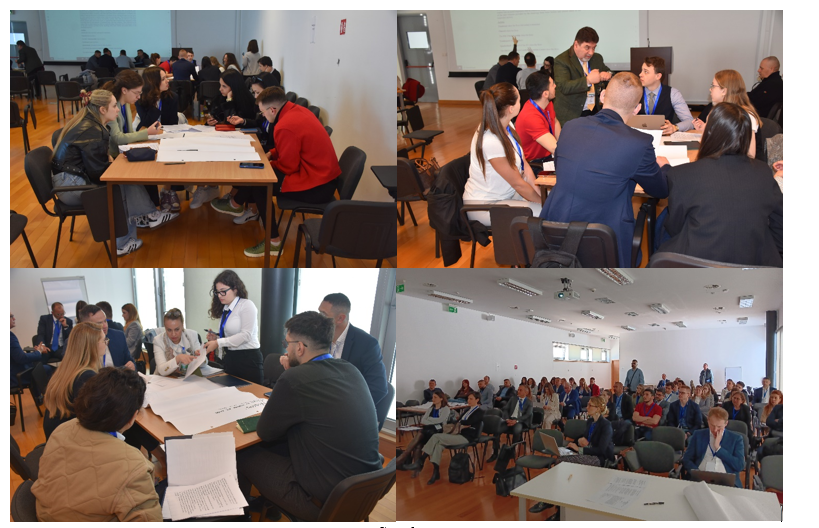 Simulation exercise[/caption]
Following a short break, the workshop featured a panel discussion titled “A Career in Arms Control, Non-Proliferation, and Disarmament: Advice and Opportunities for the Next Generation”. The speakers shared their experiences and insights on career paths, skills development, and opportunities in international organizations, think tanks, and government agencies.
[caption id="attachment_14372" align="alignnone" width="1424"]
Simulation exercise[/caption]
Following a short break, the workshop featured a panel discussion titled “A Career in Arms Control, Non-Proliferation, and Disarmament: Advice and Opportunities for the Next Generation”. The speakers shared their experiences and insights on career paths, skills development, and opportunities in international organizations, think tanks, and government agencies.
[caption id="attachment_14372" align="alignnone" width="1424"] From left to right: Prof. Sanchez Cobaleda, Federica Dall’Arche, Col (res.) László Szatmári, Paola Tessari, James Cooke, Levente Toth during the panel: “A Career in Arms Control, Non-Proliferation, and Disarmament: Advice and Opportunities for the Next Generation”[/caption]
The VCDNP and IAI thank the University of Split for hosting the event and the European Union for the generous support in making this event possible.
From left to right: Prof. Sanchez Cobaleda, Federica Dall’Arche, Col (res.) László Szatmári, Paola Tessari, James Cooke, Levente Toth during the panel: “A Career in Arms Control, Non-Proliferation, and Disarmament: Advice and Opportunities for the Next Generation”[/caption]
The VCDNP and IAI thank the University of Split for hosting the event and the European Union for the generous support in making this event possible.
More information:
Agenda The EUNPDC Consortium and its work Additional Opportunities for the Next GenerationIAEA Safeguards in Action: Implementation and the Life of a Nuclear Inspector
The VCDNP and the International Affairs Institute (IAI), on behalf of the EU Non-Proliferation and Disarmament Consortium (EUNPDC), hosted an interactive webinar featuring Eva Gyane, former IAEA nuclear safeguards inspector, to explore the IAEA’s safeguards system, careers in nuclear non-proliferation, and the day-to-day work of safeguards inspectors.
Find out more » This event was made possible thanks to the generous support of the European Union.
About the Young Women and Next Generation Initiative (YWNGI)
The YWNGI, an initiative by the VCDNP and IAI within the framework of the EU Non-Proliferation and Disarmament Consortium (EUNPDC), aims to inspire young women and the next generation to explore careers in non-proliferation, arms control, and disarmament. The initiative provides mentorship, workshops, and outreach opportunities to address gender and age imbalances in the field.
More information about the Young Women and Next Generation Initiative (YWNGI) and the Mentorship Programme can be found below:
Mentorship Programme
Young Women and Next Generation Initiative (YWNGI)
This event was made possible thanks to the generous support of the European Union.
About the Young Women and Next Generation Initiative (YWNGI)
The YWNGI, an initiative by the VCDNP and IAI within the framework of the EU Non-Proliferation and Disarmament Consortium (EUNPDC), aims to inspire young women and the next generation to explore careers in non-proliferation, arms control, and disarmament. The initiative provides mentorship, workshops, and outreach opportunities to address gender and age imbalances in the field.
More information about the Young Women and Next Generation Initiative (YWNGI) and the Mentorship Programme can be found below:
Mentorship Programme
Young Women and Next Generation Initiative (YWNGI)

Engagement Opportunities in Arms Control, Disarmament, and Non-Proliferation for Young Professionals and Students
On 25 October 2024, the Building on the success of the first edition of the event held in October 2022, the webinar informed participants about youth-led groups and initiatives […]
Find out more » On 25 October 2024, the Building on the success of the first edition of the event held in October 2022, the webinar informed participants about youth-led groups and initiatives in the field and offered a platform to connect and network.
Participants benefited from presentations by five organizations and their initiatives: The British American Security Information Council (BASIC), the European Leadership Network (ELN), the EU Nonproliferation and Disarmament Consortium (EUNPDC), the International Student/Young Pugwash (ISYP), and the United Nations Office for Disarmament Affairs (UNODA). The organizations shared information about their activities and youth programmes and offered opportunities for learning, research, and engagement on a wide range of issues within the arms control, disarmament, and non-proliferation field.
The event was organised within the framework of the Young Women and Next Generation Initiative (YWNGI), established under the EUNPDC.
On 25 October 2024, the Building on the success of the first edition of the event held in October 2022, the webinar informed participants about youth-led groups and initiatives in the field and offered a platform to connect and network.
Participants benefited from presentations by five organizations and their initiatives: The British American Security Information Council (BASIC), the European Leadership Network (ELN), the EU Nonproliferation and Disarmament Consortium (EUNPDC), the International Student/Young Pugwash (ISYP), and the United Nations Office for Disarmament Affairs (UNODA). The organizations shared information about their activities and youth programmes and offered opportunities for learning, research, and engagement on a wide range of issues within the arms control, disarmament, and non-proliferation field.
The event was organised within the framework of the Young Women and Next Generation Initiative (YWNGI), established under the EUNPDC.
 Left to right: Sanaa Alvira, Leadership Team Member at International Student/Young Pugwash, and Federica Dall’Arche, Senior Research Associate at the VCDNP
Opening remarks were delivered by Federica Dall’Arche, Senior Research Associate at the VCDNP, and Sanaa Alvira, Leadership Team Member at ISYP. Both highlighted the importance of engaging all generations and people with diverse national and cultural backgrounds to promote inclusion and diversity in the arms control, disarmament, and non-proliferation field.
Younger Generation Leaders Network (YGLN) of the ELN
Left to right: Sanaa Alvira, Leadership Team Member at International Student/Young Pugwash, and Federica Dall’Arche, Senior Research Associate at the VCDNP
Opening remarks were delivered by Federica Dall’Arche, Senior Research Associate at the VCDNP, and Sanaa Alvira, Leadership Team Member at ISYP. Both highlighted the importance of engaging all generations and people with diverse national and cultural backgrounds to promote inclusion and diversity in the arms control, disarmament, and non-proliferation field.
Younger Generation Leaders Network (YGLN) of the ELN
 Nikita Gryazin, Policy Fellow at the European Leadership Network (ELN)
Nikita Gryazin, Policy Fellow at the European Leadership Network (ELN), presented ELN’s Younger Generation Leaders Network (YGLN), a youth group which consists of 150 members from over 40 countries, which this year celebrates it 10th anniversary. YGLN holds regular events like "YGLN Wednesdays," where members exchange and connect. YGLN also publishes analyses and commentary on international affairs by its members and holds an annual gathering for in-person engagement. The network comprises four distinct groups and is led by an executive committee, helping to shape its members into future decision-makers. More information on YGLN and membership is available on the YGLN website.
The EU Nonproliferation and Disarmament Consortium (EUNPDC)
Nikita Gryazin, Policy Fellow at the European Leadership Network (ELN)
Nikita Gryazin, Policy Fellow at the European Leadership Network (ELN), presented ELN’s Younger Generation Leaders Network (YGLN), a youth group which consists of 150 members from over 40 countries, which this year celebrates it 10th anniversary. YGLN holds regular events like "YGLN Wednesdays," where members exchange and connect. YGLN also publishes analyses and commentary on international affairs by its members and holds an annual gathering for in-person engagement. The network comprises four distinct groups and is led by an executive committee, helping to shape its members into future decision-makers. More information on YGLN and membership is available on the YGLN website.
The EU Nonproliferation and Disarmament Consortium (EUNPDC)
 Manuel Herrera, Research Fellow at the Istituto Affari Internazionali (IAI)
Manuel Herrera, Research Fellow at IAI, provided an overview of the next generation activities organised by the EU Non-Proliferation and Disarmament Consortium (EUNPDC). The EUNPDC organizes and coordinates activities for a network of over 110 research centres and universities all over Europe. One of the flagship programmes of the Consortium is the YWNGI, which offers events online and on university campuses in Europe. A key part of the Initiative is an annual mentorship programme for young women. Other activities include the Next Generation Workshop – an opportunity for emerging experts to showcase their research ahead of the EUNPDC Annual Conference in Brussels. Herrera also offered an overview of the EU Non-Proliferation and Disarmament E-learning courses, a comprehensive library of interactive online courses on arms control, disarmament, and non-proliferation issues offered by the Consortium and presented the Consortium’s internship programme. More information about the Consortium can be found on the EUNPDC website.
The Youth4Disarmament Initiative of UNODA
Manuel Herrera, Research Fellow at the Istituto Affari Internazionali (IAI)
Manuel Herrera, Research Fellow at IAI, provided an overview of the next generation activities organised by the EU Non-Proliferation and Disarmament Consortium (EUNPDC). The EUNPDC organizes and coordinates activities for a network of over 110 research centres and universities all over Europe. One of the flagship programmes of the Consortium is the YWNGI, which offers events online and on university campuses in Europe. A key part of the Initiative is an annual mentorship programme for young women. Other activities include the Next Generation Workshop – an opportunity for emerging experts to showcase their research ahead of the EUNPDC Annual Conference in Brussels. Herrera also offered an overview of the EU Non-Proliferation and Disarmament E-learning courses, a comprehensive library of interactive online courses on arms control, disarmament, and non-proliferation issues offered by the Consortium and presented the Consortium’s internship programme. More information about the Consortium can be found on the EUNPDC website.
The Youth4Disarmament Initiative of UNODA
 Marykate Monaghan, Associate Political Affaris Officer at the UN Office for Disarmament Affairs (UNODA)
The Youth4Disarmament initiative, organised by the UN Office for Disarmament Affairs (UNODA), was introduced by Marykate Monaghan. She provided an overview of the initiative’s work to empower young people to champion and participate in disarmament efforts, highlighting programmes, including capacity-building workshops, creative projects, and the "Advocates in Motion (AIM) Campaign" to integrate youth perspectives into global policy-making. The initative also includes the Youth Leader Fund, a comprehensive programme running through 2030, featuring online learning, a study tour to Hiroshima and Nagasaki, mentorship, and networking for young advocates. Additionally, she encouraged youth engagement through online events, creative advocacy, joining disarmament-focused groups, and accessing educational resources like UNODA’s Disarmament Education Dashboard. More information can be found on the Youth4Disarmament website.
Emerging Voices Network (EVN) of BASIC
Marykate Monaghan, Associate Political Affaris Officer at the UN Office for Disarmament Affairs (UNODA)
The Youth4Disarmament initiative, organised by the UN Office for Disarmament Affairs (UNODA), was introduced by Marykate Monaghan. She provided an overview of the initiative’s work to empower young people to champion and participate in disarmament efforts, highlighting programmes, including capacity-building workshops, creative projects, and the "Advocates in Motion (AIM) Campaign" to integrate youth perspectives into global policy-making. The initative also includes the Youth Leader Fund, a comprehensive programme running through 2030, featuring online learning, a study tour to Hiroshima and Nagasaki, mentorship, and networking for young advocates. Additionally, she encouraged youth engagement through online events, creative advocacy, joining disarmament-focused groups, and accessing educational resources like UNODA’s Disarmament Education Dashboard. More information can be found on the Youth4Disarmament website.
Emerging Voices Network (EVN) of BASIC
 Declan Penrose, Policy Fellow at the British American Security Information Council (BASIC)
The Emerging Voices Network, which was introduced by Declan Penrose, Policy Fellow at the British American Security Information Council (BASIC), is a digital, global network of young experts and practitioners working across nuclear issues. The network emphasises the importance of cross-regional and cross-disciplinary collaboration and organises side events at international conferences, such as NPT Review Conferences, and publishes an annual series of policy papers, written by working groups of emerging nuclear experts from around the world. More information, including on ways to participate, can be found on the EVN website.
International Student/Young Pugwash (ISYP)
Declan Penrose, Policy Fellow at the British American Security Information Council (BASIC)
The Emerging Voices Network, which was introduced by Declan Penrose, Policy Fellow at the British American Security Information Council (BASIC), is a digital, global network of young experts and practitioners working across nuclear issues. The network emphasises the importance of cross-regional and cross-disciplinary collaboration and organises side events at international conferences, such as NPT Review Conferences, and publishes an annual series of policy papers, written by working groups of emerging nuclear experts from around the world. More information, including on ways to participate, can be found on the EVN website.
International Student/Young Pugwash (ISYP)
 Kseniia Pirnavskaia, Deputy Director at International Student/Young Pugwash
The work of ISYP, a global, interdisciplinary network of students, young professionals, and national groups, was presented by Deputy Director Kseniia Pirnavskaia. She explained how ISYP covers a wide range of topics related to existential risk, including climate change, emerging technologies, and nuclear weapons. with the aim of nurturing understanding and build personal connections for peace-promoting policy-making. More information on ISYP and on how to participate is available on the ISYP website.
Kseniia Pirnavskaia, Deputy Director at International Student/Young Pugwash
The work of ISYP, a global, interdisciplinary network of students, young professionals, and national groups, was presented by Deputy Director Kseniia Pirnavskaia. She explained how ISYP covers a wide range of topics related to existential risk, including climate change, emerging technologies, and nuclear weapons. with the aim of nurturing understanding and build personal connections for peace-promoting policy-making. More information on ISYP and on how to participate is available on the ISYP website.
 Event participants and organisers
Panellists also shared their personal experiences and career journeys, entering and navigating the field, emphasising the challenges and rewards they encountered.
The lively discussion following the presentations touched upon many topics, including work-life balance, mental health, the inclusion of people with disabilities, as well as gender and geographical barriers, among others. The rich conversation offered practical insights for young professionals aspiring to make a meaningful impact in the field.
Closing remarks were delivered by Paola Tessari, Senior Researcher at IAI, and Kseniia Pirnavskaia, Deputy Director at ISYP, who shared information on additional opportunities available in the field and thanked the panellists for sharing helpful advice and guidance.
Event participants and organisers
Panellists also shared their personal experiences and career journeys, entering and navigating the field, emphasising the challenges and rewards they encountered.
The lively discussion following the presentations touched upon many topics, including work-life balance, mental health, the inclusion of people with disabilities, as well as gender and geographical barriers, among others. The rich conversation offered practical insights for young professionals aspiring to make a meaningful impact in the field.
Closing remarks were delivered by Paola Tessari, Senior Researcher at IAI, and Kseniia Pirnavskaia, Deputy Director at ISYP, who shared information on additional opportunities available in the field and thanked the panellists for sharing helpful advice and guidance.Open Source Intelligence and Public Speaking Workshops: Skill Building opportunities for YWNGI Mentorship Programme participants
The Vienna Center for Disarmament and Non-Proliferation (VCDNP) and the International Affairs Institute (IAI) organise an outreach event to the University of Innsbruck to engage the next generation and raise awareness on non-proliferation, disarmament and arms control issues..
Find out more » The workshop addressed the basics of open-source intelligence (OSINT) and its application by international organisations, NGOs, and governments. It covered in detail media, image, and video analysis as a tool to conduct fact-checking activities and dispel false information.
A part of the discussion was also devoted to artificial intelligence and the future of OSINT. Elin Berger presented the latest technological advancements, highlighting the challenges posed by the intersection between OSINT and AI as well as the unintended consequences of exposing information, including privacy concerns, social engineering, information warfare, security risks, and ethical dilemmas.
The second capacity-building activity, titled “Mindful Communication” was organised as a series of three workshops delivered by Scott Morgan, a leadership and communication coach with over 30 years of experience.
Through tailored examples and exercises, the interactive workshops covered the basics of effective public speaking, providing participants with useful tips on how to deliver academic presentations, how to participate in panel discussions (both as moderator and as a panelist), and how to prepare for and deliver media interviews. Participants were challenged to think outside the box, react to ad-hoc and improvised prompts, and to test their ways of communicating.
The workshop addressed the basics of open-source intelligence (OSINT) and its application by international organisations, NGOs, and governments. It covered in detail media, image, and video analysis as a tool to conduct fact-checking activities and dispel false information.
A part of the discussion was also devoted to artificial intelligence and the future of OSINT. Elin Berger presented the latest technological advancements, highlighting the challenges posed by the intersection between OSINT and AI as well as the unintended consequences of exposing information, including privacy concerns, social engineering, information warfare, security risks, and ethical dilemmas.
The second capacity-building activity, titled “Mindful Communication” was organised as a series of three workshops delivered by Scott Morgan, a leadership and communication coach with over 30 years of experience.
Through tailored examples and exercises, the interactive workshops covered the basics of effective public speaking, providing participants with useful tips on how to deliver academic presentations, how to participate in panel discussions (both as moderator and as a panelist), and how to prepare for and deliver media interviews. Participants were challenged to think outside the box, react to ad-hoc and improvised prompts, and to test their ways of communicating.
 More information:
Agenda of the outreach event
The EUNPDC Consortium and its work
Additional Opportunities for the Next Generation
The YWNGI is possible thanks to the generous support of the European Union and aims to engage the next generation and raise awareness on non-proliferation, disarmament and arms control issues. The VCDNP and IAI thank the University of Innsbruck for hosting the event.
More information:
Agenda of the outreach event
The EUNPDC Consortium and its work
Additional Opportunities for the Next Generation
The YWNGI is possible thanks to the generous support of the European Union and aims to engage the next generation and raise awareness on non-proliferation, disarmament and arms control issues. The VCDNP and IAI thank the University of Innsbruck for hosting the event.

The Nuclear Dimensions of the War against Ukraine
The Vienna Center for Disarmament and Non-Proliferation (VCDNP) and the International Affairs Institute (IAI) organise an outreach event to the University of Innsbruck to engage the next generation and raise awareness on non-proliferation, disarmament and arms control issues..
Find out more »- Ettore Greco, Executive Vice President, IAI, who examined the origins of the war, discussing the overall geopolitical environment and challenges that led to the Russian invasion in February 2022;
- Nikolai Sokov, Senior Fellow, VCDNP, who discussed the nuclear dimension of the war, including the potential use of nuclear weapons, risks of escalation, as well as the impact that the war is generating on arms control and Russia-West relations more broadly;
- Elena Sokova, Executive Director, VCDNP, who drew attention to the risks related to nuclear safety and security of nuclear facilities, including the occupied Zaporizhzhia nuclear power plant.
 The second panel of the event was dedicated to the work of the EUNPDC and to opportunities for young women and the next generation in the arms control, non-proliferation and disarmament field.
The panel featured (in order of appearance):
The second panel of the event was dedicated to the work of the EUNPDC and to opportunities for young women and the next generation in the arms control, non-proliferation and disarmament field.
The panel featured (in order of appearance):
- Manuel Herrera, Senior Researcher, IAI, who provided an overview of the EUNPD Consortium and its work, including specific activities organised by each member of the Consortium;
- Federica Dall’Arche, Senior Research Associate, VCDNP, who discussed opportunities in the field available for young students and practitioners, including those offered by the EUNPDC such as internships, e-learning courses, and the YWNGI mentorship programme;

From the left: Manuel Herrera, Martin Senn, Federica Dall’Arche
Both panels were moderated by Martin Senn, Professor at the University of Innsbruck. More information: Agenda of the outreach event The EUNPDC Consortium and its work Additional Opportunities for the Next Generation The YWNGI is possible thanks to the generous support of the European Union and aims to engage the next generation and raise awareness on non-proliferation, disarmament and arms control issues. The VCDNP and IAI thank the University of Innsbruck for hosting the event.
The War in Ukraine, Authoritarian Regimes and Opportunities for the Next Generation in Non-Proliferation: VCDNP and PRCP joint event at the Charles University of Prague
The War in Ukraine, Authoritarian Regimes and Opportunities for the Next Generation in Non-Proliferation: VCDNP and PRCP joint event at the Charles University of Prague On 21 April 2023, […]
Find out more »
The War in Ukraine, Authoritarian Regimes and Opportunities for the Next Generation in Non-Proliferation: VCDNP and PRCP joint event at the Charles University of Prague
On 21 April 2023, the Vienna Center for Disarmament and Non-Proliferation (VCDNP) joined the Peace Research Center Prague (PRCP) in the organization of the PRCP Annual Conference at the Charles University, Faculty of Law.
The VCDNP contributed to the event as part of its outreach activity to European universities under the Young Women and Next Generation Initiative (YWNGI). The YWNGI was jointly established by the VCDNP and the Istituto Affari Internazionali (IAI) and within the framework of the EU Non-Proliferation and Disarmament Consortium (EUNPDC) in an effort to engage the next generation in non-proliferation, disarmament and arms control.
The first panel of the event was dedicated to the War in Ukraine. Speakers provided an assessment one year after the start of the conflict, discussing current developments, the military strategies of both sides, as well as possible future scenarios. The panel was moderated by Michal Smetana (PRCP) and included the following speakers:
- Sir Lawrence Freedman (King’s College London)
- Nina Tannenwald (Brown University)
- Harald Müller (Peace Research Institute Frankfurt/PRCP)
- Hanna Notte (VCDNP)
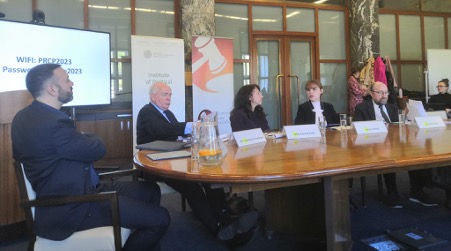
From the left: Michal Smetana, Sir Lawrence Freedman, Nina Tannenwald, Hanna Notte and Harald Müller
The second panel, dedicated to authoritarian regimes in the Middle East and North Africa, featured:
- Noura Wahby (American University in Cairo)
- Tereza Jermanová (PRCP)
- Jakub Koláček (Charles University)
The panel was moderated by Jan Daniel (PRCP) and explored authoritarian practices as well as ways in which the undemocratic rule is challenged by citizens and various movements.
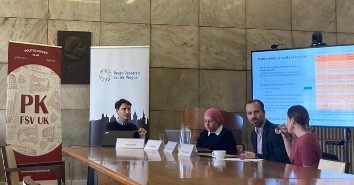
From the left: Jan Daniel, Noura Wahby, Jakub Koláček, and Tereza JermanovÁ
The third panel was dedicated to the work of the EUNPDC and to opportunities for young women and the next generation in the arms control, non-proliferation and disarmament field. The panel featured:
- Paola Tessari (IAI)
- Federica Dall’Arche (VCDNP)
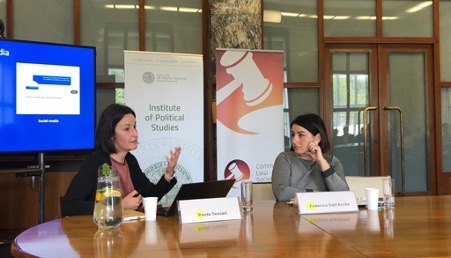
From the left: Paola Tessari and Federica Dall’Arche
Harald Müller, one of the original co-founder of the EUNPD Consortium, also contributed to the panel, sharing his experience in establishing the Consortium.

Harald Müller talking about the EUNPD Consortium
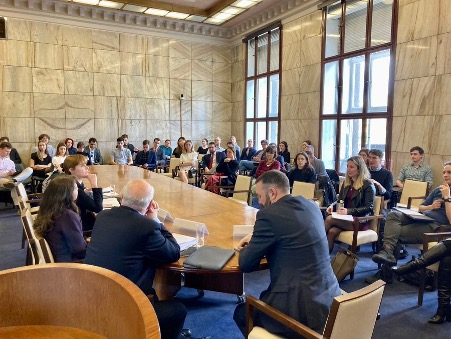
All panels were followed by Q&A sessions.
The presentation of the event is available on : The EUNPD Consortium and its work For further informations on Youth opportunities linked with the consortium activities : Additional Opportunities for the Next GenerationFor more information, please refer to the Young Women and Next Generation Initiative website or to the Event Page
Nuclear Weapons and Artificial Intelligence: Understanding the Nexus and Mitigating Risks
Nuclear Weapons and Artificial Intelligence: Understanding the Nexus and Mitigating Risks The Vienna Center for Disarmament and Non‑Proliferation (VCDNP) and the International Affairs Institute (IAI) in the framework of the […]
Find out more »Nuclear Weapons and Artificial Intelligence: Understanding the Nexus and Mitigating Risks
- Marina Favaro, Senior Policy Analyst, Anthropic
Registration and Questions
We kindly ask you to RSVP using the online registration form. Should you have any questions, please direct your inquiries to events@vcdnp.org or call VCDNP at +43-1-236-94-82. In case you have troubles accessing the online registration form, please email events@vcdnp.org.Opportunities, Threats and Proliferation Challenges deriving from Bio-Technology and Bio-Engineering
On 16 January 2023, as part of the Young Women and Next Generation Initiative (YWNGI), the International Affairs Institute (IAI) and the Vienna Center for Disarmament and Non-Proliferation (VCDNP) with […]
Find out more »- Dr Angela Kane, former UN High Representative for Disarmament Affairs and Senior Fellow at the Vienna Center for Disarmament and Non-Proliferation (VCDNP) and Senior Adviser at the Nuclear Threat Initiative (NTI);
- Dr Filippa Lentzos, Associate Professor in Science & International Security at King’s College London; and
- Dr James Revill, Head of the WMD and Space Security Programmes at the United Nations Institute for Disarmament Research (UNIDIR).
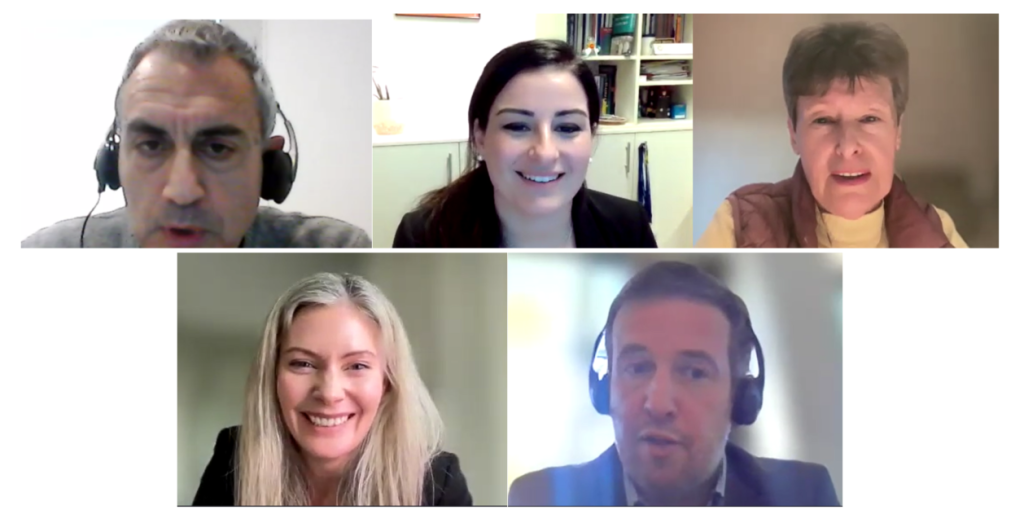
From the top left: Ettore Greco, Federica Dall’Arche, Dr. Angela Kane, Dr. Filippa Lentzos, Dr. James Revill
The discussion was followed by a Q&A session, which covered a wide-spectrum of topics, ranging from Covid-19 to risk-assessment scenarios passing through the role of non-state actors. A full recording of the event can be found here: https://www.youtube.com/watch?v=KgBdPkKm7tQEngagement Opportunities in Arms Control, Disarmament and Non-Proliferation for Young Professionals and Students
International Security, Nuclear Weapons and the War in Ukraine
10 October 2022, 15:00 – 17:00 Via Gabriello Chiabrera 199, Roma sala delle Lauree Hybrid Format The Vienna Center for Disarmament and Non-Proliferation (VCDNP) and the International Affairs Institute (IAI), […]
Find out more »Agenda
15:00 International Security, Nuclear Weapons and the War in The Ukraine Welcome Address and Moderation Marilena Gala, Associate Professor, Roma Tre University Panelists Ettore Greco, Executive Vice President, International Affairs Institute, Rome Hanna Notte, Senior Research Associate, Vienna Center for Disarmament and Non-Proliferation Leopoldo Nuti, Professor, Roma Tre University Q&A 16:15 Break 16:25 The EUNPD Consortium and Other Initiatives and Opportunities Moderation Leopoldo Nuti, Professor, Roma Tre University Panelists Federica Dall’Arche, Senior Research Associate, Vienna Center for Disarmament and Non-Proliferation Manuel Herrera, Researcher, International Affairs Institute, Rome,. Q&A 17:00 Meeting EndsYoung Women and Next Generation Initiative in Non-Proliferation and Disarmament Mentorship Programme – 1st Edition Final Meeting
On 28-29 April 2022, the IAI and the VCDNP organized the Final Meeting of the first edition of the Young Women and Next Generation Initiative in Non-Proliferation and Disarmament Mentorship Programme.
Find out more »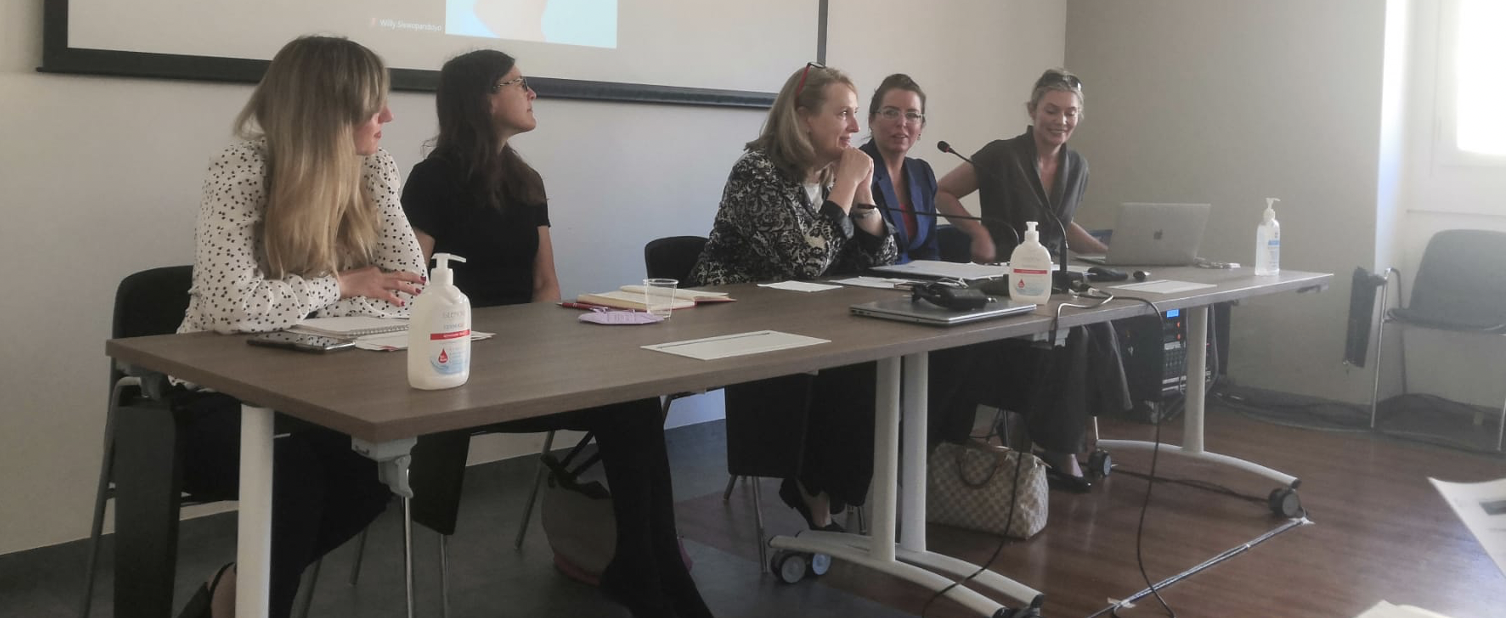 During the second panel, three Mentees of the programme, Intan Bedisa (International NGO Forum on Indonesian Development, INFID), Stella Blumfelde (University of Genoa) and Emily Faux (University of Leeds), presented on issues related to non-proliferation and disarmament, specifically: regional approaches to nuclear non-proliferation, cybersecurity and disinformation, and popular culture and nuclear politics respectively. The panel was co-moderated by Mara Zarka (VCDNP) and Manuel Herrera (IAI).
During the second panel, three Mentees of the programme, Intan Bedisa (International NGO Forum on Indonesian Development, INFID), Stella Blumfelde (University of Genoa) and Emily Faux (University of Leeds), presented on issues related to non-proliferation and disarmament, specifically: regional approaches to nuclear non-proliferation, cybersecurity and disinformation, and popular culture and nuclear politics respectively. The panel was co-moderated by Mara Zarka (VCDNP) and Manuel Herrera (IAI).
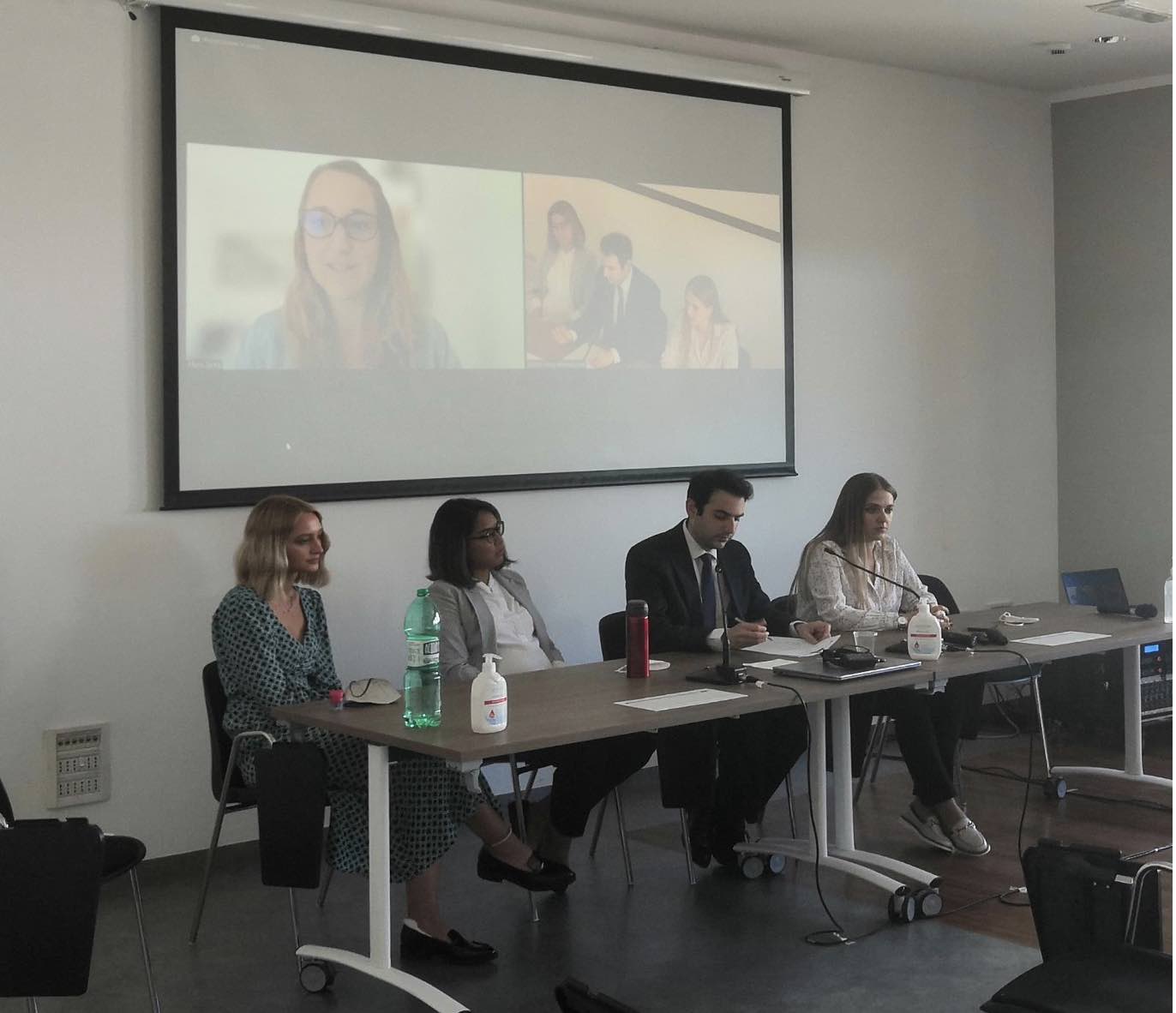 The last panel was devoted to a comprehensive evaluation of the programme with a view to receiving feedbacks and making improvements for future editions. The open discussion was moderated by Federica Dall’Arche (VCDNP).
The last panel was devoted to a comprehensive evaluation of the programme with a view to receiving feedbacks and making improvements for future editions. The open discussion was moderated by Federica Dall’Arche (VCDNP).
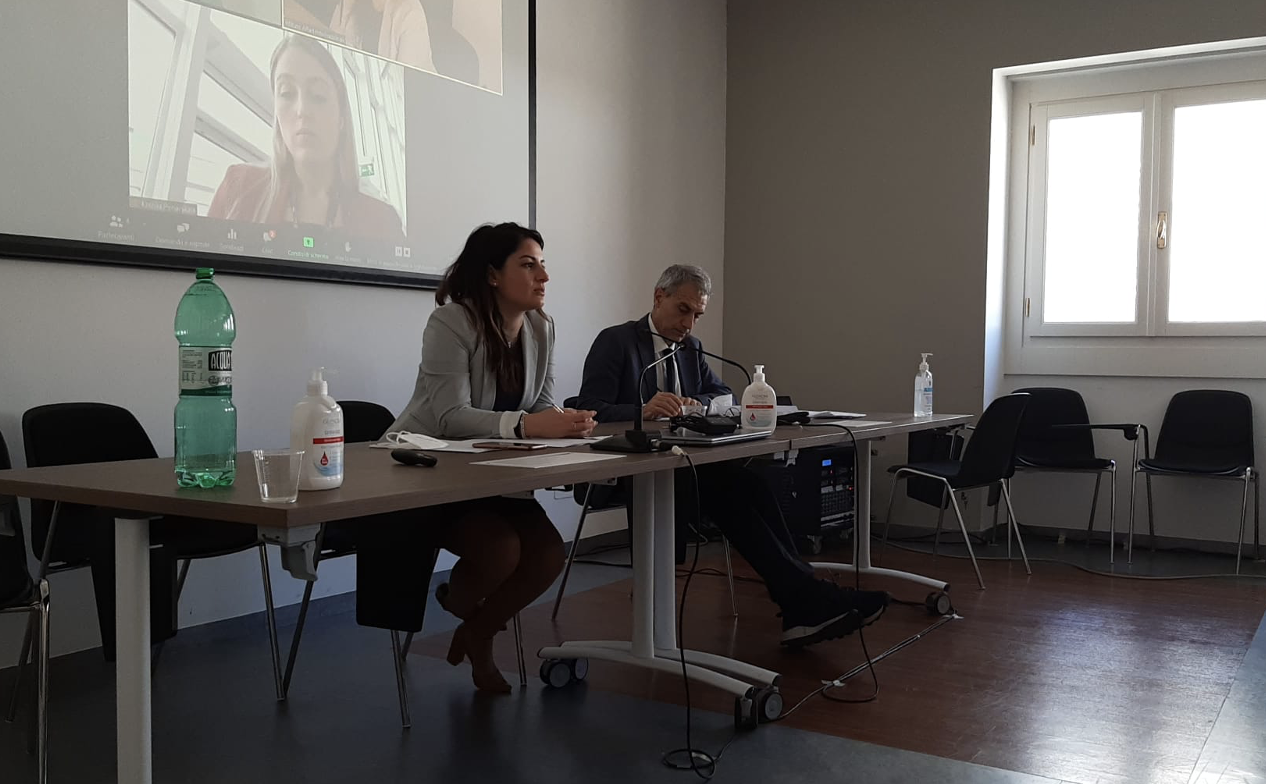 The event was opened by IAI Director Nathalie Tocci, while closing remarks were delivered by Ettore Greco (IAI).
The event was opened by IAI Director Nathalie Tocci, while closing remarks were delivered by Ettore Greco (IAI).
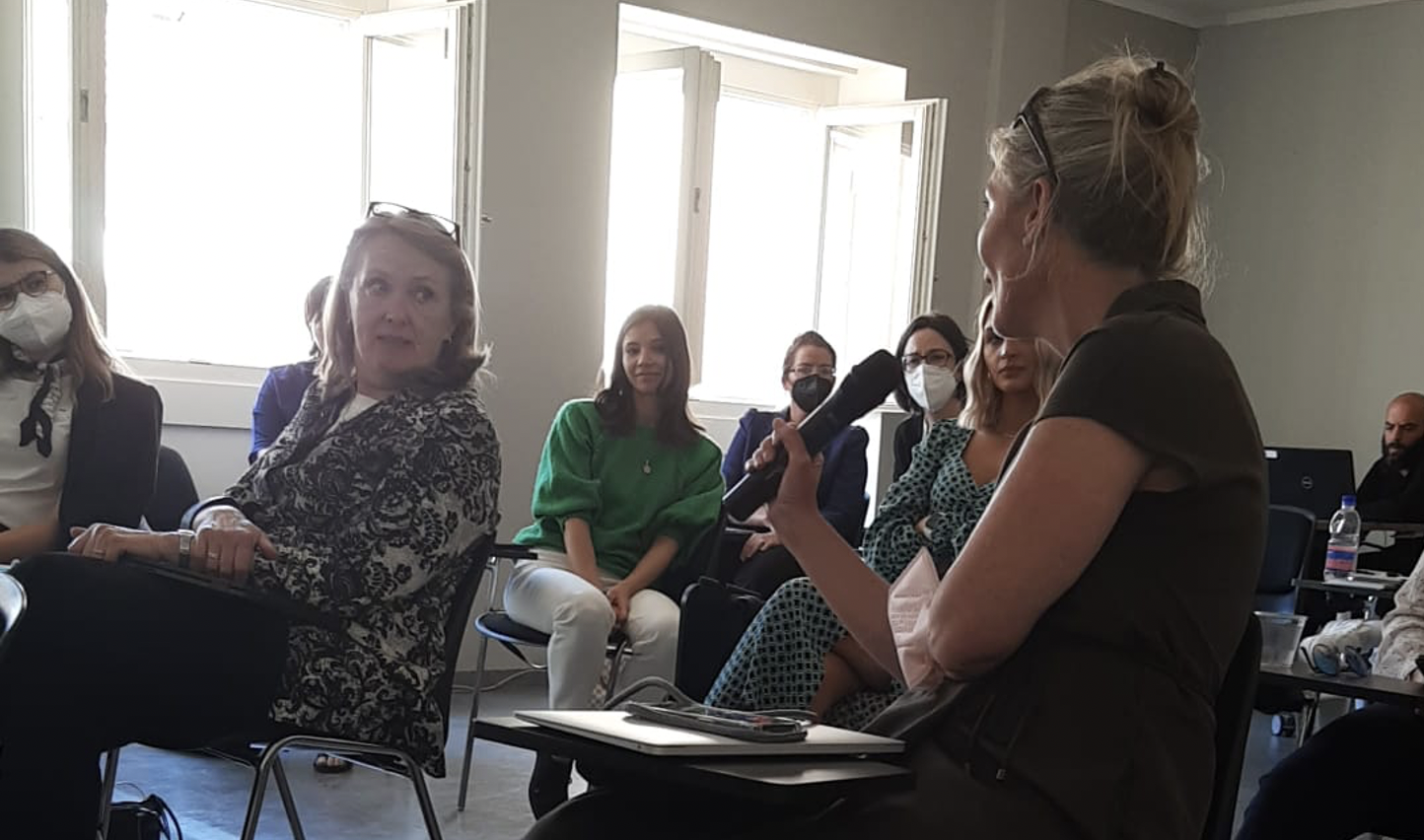 For more information, please visit the website of the initiative below:
http://frs.agni.fr/activities/education-programmes/young-women-and-next-generation-initiative/
For more information, please visit the website of the initiative below:
http://frs.agni.fr/activities/education-programmes/young-women-and-next-generation-initiative/
Roma, 00186 Italy
Working at International Organisations: Tips and Insights for the Next Generation – the BWC and the OPCW
On 31 March 2022, the VCDNP and the IAI organized the fourth YWNGI webinar, featuring representatives from the BWC-ISU and the OPCW.
Find out more » Daniel Feakes started his remarks with the hindsight of his own career path. Starting with an internship in academia focused on chemical and biological issues, he has now been working in the field for over 20 years. Feakes noted how a technical degree is not required in order to enter the field and that history, international relations, and regional studies students are all well equipped for a career in this field. Feakes then provided a brief overview of the Biological and Toxins Weapons Convention (BWC), highlighting its key functions such as sustaining the unequivocal norm against these weapons, creating the platform for a global dialogue, promoting peaceful uses of biological agents and toxins, and building transparency among States. He also provided an overview of the work of the ISU, which is based in the Geneva Branch of the UN Office for Disarmament Affairs (UNODA).
Feakes noted that nowadays young people can find numerous professional and educational opportunities online, pointing specifically to the UNODA website, including information on the Youth4Disarmament initiative. He also highlighted the United Nations career opportunities for youth, which include internships, the Young Professionals Programme (YPP), and the Junior Professional Officer Programme (JPO).
Among other opportunities, Feakes mentioned several intended for young scientists including the 6th Annual Next Generation For Biosecurity Competition, IFBA Global Mentorship program, iGEM 2022 Grand Jamboree, Emerging Leaders in Biosecurity Fellowship, and Biosecurity Champions Fellowship.
He concluded his remarks by mentioning the Youth Declaration for Biosecurity that was developed by young scientists participating in the Second Edition of the Biosecurity Diplomacy Workshop for Young Scientists from the Global South held in 2021. “Such opportunities can arise from networking and collective brain power, collective activism, dedication, and commitment.”
Daniel Feakes started his remarks with the hindsight of his own career path. Starting with an internship in academia focused on chemical and biological issues, he has now been working in the field for over 20 years. Feakes noted how a technical degree is not required in order to enter the field and that history, international relations, and regional studies students are all well equipped for a career in this field. Feakes then provided a brief overview of the Biological and Toxins Weapons Convention (BWC), highlighting its key functions such as sustaining the unequivocal norm against these weapons, creating the platform for a global dialogue, promoting peaceful uses of biological agents and toxins, and building transparency among States. He also provided an overview of the work of the ISU, which is based in the Geneva Branch of the UN Office for Disarmament Affairs (UNODA).
Feakes noted that nowadays young people can find numerous professional and educational opportunities online, pointing specifically to the UNODA website, including information on the Youth4Disarmament initiative. He also highlighted the United Nations career opportunities for youth, which include internships, the Young Professionals Programme (YPP), and the Junior Professional Officer Programme (JPO).
Among other opportunities, Feakes mentioned several intended for young scientists including the 6th Annual Next Generation For Biosecurity Competition, IFBA Global Mentorship program, iGEM 2022 Grand Jamboree, Emerging Leaders in Biosecurity Fellowship, and Biosecurity Champions Fellowship.
He concluded his remarks by mentioning the Youth Declaration for Biosecurity that was developed by young scientists participating in the Second Edition of the Biosecurity Diplomacy Workshop for Young Scientists from the Global South held in 2021. “Such opportunities can arise from networking and collective brain power, collective activism, dedication, and commitment.”
 Elisabeth Waechter provided an overview of the OPCW and its work. Waechter noted that the OPCW is the implementing body of the legally binding Chemical Weapons Convention (CWC), which aims to eliminate chemical weapons in all aspects, including development, production, stockpiling, transfer and use. In 2013, the Organisation was awarded the Nobel Peace Prize for its extensive efforts in eliminating chemical weapons. This was particularly timely given the OPCW’s active involvement in overseeing the elimination of Syria’s chemical weapons programme in the safest and most secure manner possible since the country’s accession to the CWC in 2013. She also explained the history, goals and mandate of the OPCW, highlighting that the Organisation also works on preventing the use of chemical weapons and potential responses to such use, and promotes peaceful uses of chemistry.
In reference to her career, Waechter defined herself as an experienced international civil servant having worked in numerous UN bodies, many of which were focused on disarmament. When speaking about her work within the OPCW, she highlighted that one of the key areas her Division is tasked with is the achievement of the CWC’s universality. In this regard, Waechter stressed the importance of communication in the disarmament field, especially since it does not always receive the attention it deserves:“There is a lot to do and learn in the area of science communication and communication around disarmament.”Waechter noted that the OPCW is always recruiting, therefore she encouraged the audience to explore the OPCW’s twitter, LinkedIn, and employment pages, highlighting the paid internship opportunities available in different sectors within the Organisation.
Elisabeth Waechter provided an overview of the OPCW and its work. Waechter noted that the OPCW is the implementing body of the legally binding Chemical Weapons Convention (CWC), which aims to eliminate chemical weapons in all aspects, including development, production, stockpiling, transfer and use. In 2013, the Organisation was awarded the Nobel Peace Prize for its extensive efforts in eliminating chemical weapons. This was particularly timely given the OPCW’s active involvement in overseeing the elimination of Syria’s chemical weapons programme in the safest and most secure manner possible since the country’s accession to the CWC in 2013. She also explained the history, goals and mandate of the OPCW, highlighting that the Organisation also works on preventing the use of chemical weapons and potential responses to such use, and promotes peaceful uses of chemistry.
In reference to her career, Waechter defined herself as an experienced international civil servant having worked in numerous UN bodies, many of which were focused on disarmament. When speaking about her work within the OPCW, she highlighted that one of the key areas her Division is tasked with is the achievement of the CWC’s universality. In this regard, Waechter stressed the importance of communication in the disarmament field, especially since it does not always receive the attention it deserves:“There is a lot to do and learn in the area of science communication and communication around disarmament.”Waechter noted that the OPCW is always recruiting, therefore she encouraged the audience to explore the OPCW’s twitter, LinkedIn, and employment pages, highlighting the paid internship opportunities available in different sectors within the Organisation.
 The discussion following the presentations covered a wide spectrum of topics, ranging from the most appropriate fields of study to ways to stand out, including the most useful skills and core competencies to acquire. Among the traditionally desirable skills like strong English language and knowledge of other languages, leadership, teamwork, intercultural communications, creativity, willingness to learn, and IT skills were also mentioned. “Anything that is related to social media, layout and design of publication and infographics - those additional skills certainly help people to stand out from the crowd.”
Speakers also provided information regarding the recruitment process and shared tips for solid applications and successful competency-based interviews. Both speakers encouraged applicants to be patient and to keep trying even when faced with numerous rejections. They stressed that it is a myth that you will not get hired if you do not know someone within the organisation or wider UN network, emphasizing: “If you do not apply you will not have a chance”.
The event concluded with both representatives sharing their personal motivation to work in the biological and chemical disarmament field. Waechter stressed that as an international servant for 17 years, she could not imagine doing any other work indicating that “what drives me is the realisation that what we do matters, that it is important.” Feakes agreed and added that both passion and motivation are needed in order to do this type of job, concluding that “the main purpose of what we are doing, preventing biological or chemical weapons from being developed and used, that is the kind of noble thing to be doing.”
The full recording of the outreach event can be found below:
https://youtu.be/GIupdeBfVGY
For more information:
The discussion following the presentations covered a wide spectrum of topics, ranging from the most appropriate fields of study to ways to stand out, including the most useful skills and core competencies to acquire. Among the traditionally desirable skills like strong English language and knowledge of other languages, leadership, teamwork, intercultural communications, creativity, willingness to learn, and IT skills were also mentioned. “Anything that is related to social media, layout and design of publication and infographics - those additional skills certainly help people to stand out from the crowd.”
Speakers also provided information regarding the recruitment process and shared tips for solid applications and successful competency-based interviews. Both speakers encouraged applicants to be patient and to keep trying even when faced with numerous rejections. They stressed that it is a myth that you will not get hired if you do not know someone within the organisation or wider UN network, emphasizing: “If you do not apply you will not have a chance”.
The event concluded with both representatives sharing their personal motivation to work in the biological and chemical disarmament field. Waechter stressed that as an international servant for 17 years, she could not imagine doing any other work indicating that “what drives me is the realisation that what we do matters, that it is important.” Feakes agreed and added that both passion and motivation are needed in order to do this type of job, concluding that “the main purpose of what we are doing, preventing biological or chemical weapons from being developed and used, that is the kind of noble thing to be doing.”
The full recording of the outreach event can be found below:
https://youtu.be/GIupdeBfVGY
For more information:
- Daniel Feakes can be contacted at daniel.feakes@un.org and his presentation is available for download here.
- Elisabeth Waechter can be contacted at elisabeth.waechter@opcw.org and her presentation is available for download here.
Young Women and Next Generation Initiative – Fourth Outreach Event
The International Affairs Institute (IAI) and the Vienna Center for Disarmament and Non Proliferation (VCDNP) will organize a virtual event entitled: “Working at International Organizations: Tips and Insights for the […]
Find out more » The International Affairs Institute (IAI) and the Vienna Center for Disarmament and Non Proliferation (VCDNP) will organize a virtual event entitled: “Working at International Organizations: Tips and Insights for the Next Generation – the BWC and the OPCW.”
The event will be held on Thursday, 31 March 2022 from 3:00 to 4:15 PM (CEST) via Zoom.
The webinar will feature introductory presentations by representatives from the Implementation Support Unit (ISU) of the Biological and Toxins Weapons Convention (BWC) and the Organization for the Prohibition of Chemical Weapons (OPCW). Speakers will share their personal experience in the field and provide insights and information, including how to enter and advance in a career in the non-proliferation and disarmament field with a focus on biological and chemical sciences. Following the experts’ remarks, the meeting will be open for questions and comments from the audience.
The event will be open to the general public and will be held as a part of the Young Women and Next Generation Initiative, led by the VCDNP and the International Affairs Institute (IAI) in the framework and with the support of the EU Non-Proliferation and Disarmament (EUNPD) Consortium.
ACCESS THE AGENDA HERE
ACCESS THE REGISTRATION FORM HERE
The opinions/views expressed by the speakers in the event do not necessarily reflect the opinions/views of the International Affairs Institute nor the Vienna Center for Disarmament and Non-Proliferation nor their employees.
The International Affairs Institute (IAI) and the Vienna Center for Disarmament and Non Proliferation (VCDNP) will organize a virtual event entitled: “Working at International Organizations: Tips and Insights for the Next Generation – the BWC and the OPCW.”
The event will be held on Thursday, 31 March 2022 from 3:00 to 4:15 PM (CEST) via Zoom.
The webinar will feature introductory presentations by representatives from the Implementation Support Unit (ISU) of the Biological and Toxins Weapons Convention (BWC) and the Organization for the Prohibition of Chemical Weapons (OPCW). Speakers will share their personal experience in the field and provide insights and information, including how to enter and advance in a career in the non-proliferation and disarmament field with a focus on biological and chemical sciences. Following the experts’ remarks, the meeting will be open for questions and comments from the audience.
The event will be open to the general public and will be held as a part of the Young Women and Next Generation Initiative, led by the VCDNP and the International Affairs Institute (IAI) in the framework and with the support of the EU Non-Proliferation and Disarmament (EUNPD) Consortium.
ACCESS THE AGENDA HERE
ACCESS THE REGISTRATION FORM HERE
The opinions/views expressed by the speakers in the event do not necessarily reflect the opinions/views of the International Affairs Institute nor the Vienna Center for Disarmament and Non-Proliferation nor their employees.Do You Aspire to Work at an International Organization? Tips and Insights for Young Professionals.
The Vienna Center for Disarmament and Non-Proliferation (VCDNP) cordially invites you to attend a virtual event for young professionals and students interested in working at and engaging with international organisations […]
Find out more »Registration and Questions
We kindly ask you to RSVP using the online registration form. By registering for this event you acknowledge and agree to the VCDNP Responsible & Respectful Behavior Policy.The European Union’s Role in Non-Proliferation and Disarmament and Its Engagement with Academia and The Younger Generation
On 29 April 2021, as part of the Young Women and Next Generation Initiative (YWNGI), the VCDNP and the International Affairs Institute (IAI) in Rome, Italy, with the support of the […]
Find out more »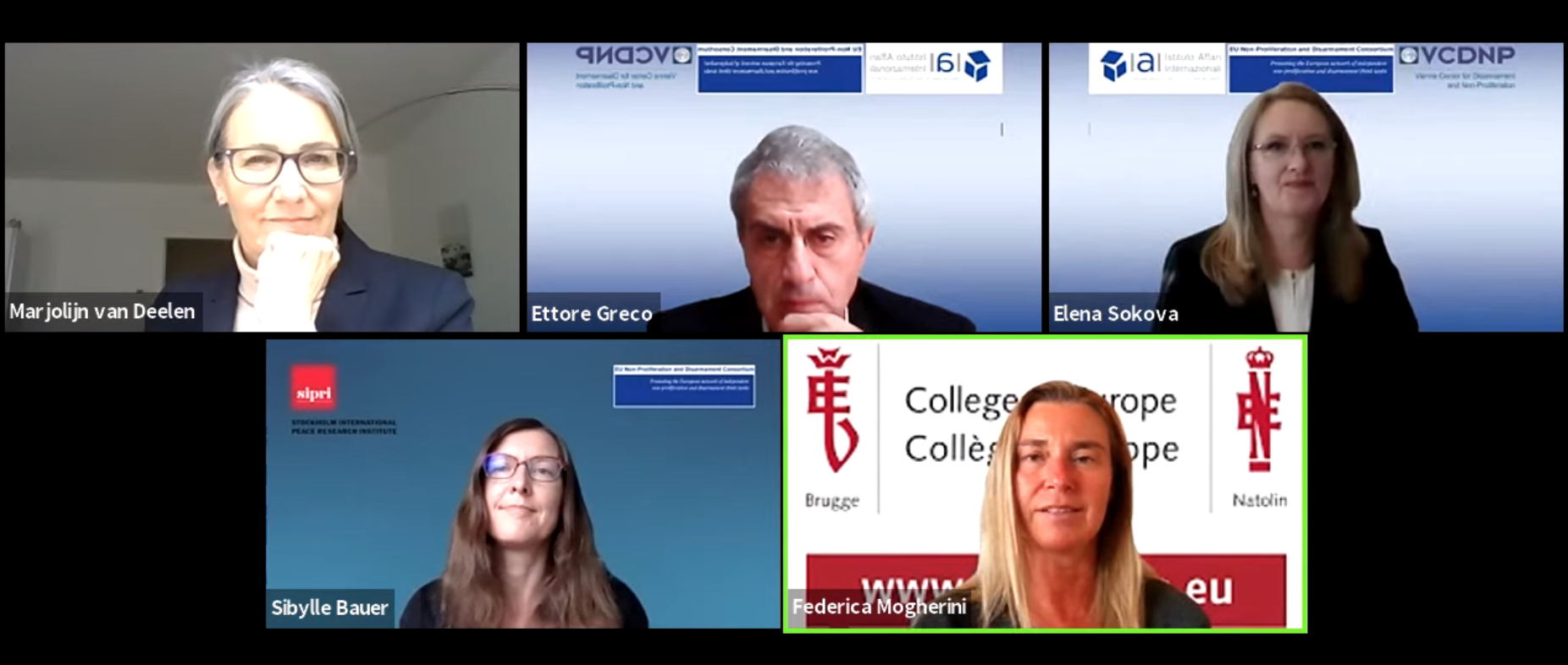 IAI’s Executive Vice President Ettore Greco provided welcome remarks and VCDNP’s Executive Director Elena Sokova moderated the session. Over 300 individuals attended the event, including many of the Young Women in Non‑Proliferation and Disarmament Mentorship Programme participants and other EUNPDC next generation conference and training course individuals. The high level of interest demonstrates the strong need for these discussions and opportunities to interact.
IAI’s Executive Vice President Ettore Greco provided welcome remarks and VCDNP’s Executive Director Elena Sokova moderated the session. Over 300 individuals attended the event, including many of the Young Women in Non‑Proliferation and Disarmament Mentorship Programme participants and other EUNPDC next generation conference and training course individuals. The high level of interest demonstrates the strong need for these discussions and opportunities to interact.
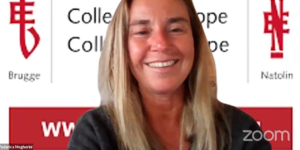
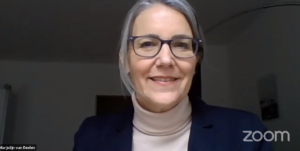
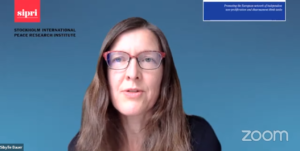
- Clear thinking and solid analysis;
- Excellence;
- Commitment;
- Authenticity;
- Integrity;
- Empathy, in which active listening and really caring was stressed; and
- Creative Problem Solving.
“What also is really important, I think, is to help others not just get a foot in the door but then to help them stay in the field and climb up.” – Sibylle BauerAdding to this list, other panellists emphasized the importance of working in teams, indicating that every role in a team is important and no one role should be perceived as any more or less significant.
“You need a mix of people that have different competences and when you put those together you can be much stronger.” – Marjolijn van DeelenThere was resounding agreement that passion and interest in what one is doing is the best guide to navigating one’s career. Also, the panellists encouraged participants to not be afraid to try new things and to be willing to go into depth on topics that may not fall within their educational background, whether it be more policy-oriented or technical.
“I think passion in what you are doing is the only thing that really counts.” – Federica MogheriniSome highlights from the question-and-answer session include insights into the difficulties in forming a common position in the EU, noting the diversity of the group and the need for fierce, internal debates. Once a common position or statement has been agreed, it serves as an umbrella under which other like-minded countries can align themselves. All speakers stressed that given the divergent views within the EU, when a common position has been adopted, especially on controversial matters, it is a powerful statement that can offer hope to the larger international community and refocus energy on where agreement exists, and action can be taken.
EU Non-Proliferation and Disarmament Next Generation Follow-Up Meeting
Due to the current COVID-19 pandemic, there are currently few opportunities for the next generation to meet around the world and think together about the great challenges of our times. […]
Find out more »VIEW THE MEETING AGENDA
The Impact of COVID-19 and other Bio-Security Challenges
The first topic was addressed by Dr. Filippa Lentzos, Senior Research Fellow at the King’s College London. As pointed by Federica Dall’Arche, Researcher at IAI and moderator of the panel, the topic was particularly timely due to recent discussions on the origin of the virus. In order to reach an assessment of the health and societal impacts caused by COVID-19, Dr. Lentzos walked the participants through an accurate and anguished timeline of the pandemic stressing, in particular, the evolution of the Chinese government’s narrative on the spread of the virus, the role of the World Health Organization and the progressive recognition of the modalities of human-to-human transmission. As the pandemic escalated, however, many questions remain unanswered, according to Dr. Lentzos. The direct impact of the virus on health is still poorly understood and the extent of the indirect and long-term consequences will only fully emerge with time. The enormous socioeconomic effects of the virus, however, are already clear. Dr. Lentzos noted how the virus led to the disappearance of 225 million full-time jobs around the world and has exacerbated long-standing economic, racial and gender divides. Women, in particular, are paying the highest price, comprising 70% of global health and social care personnel. In addition to the consequently increased exposure to risk, women are also victims of what UN Women has called “the shadow pandemic,” i.e. a worrying increase in gender-based violence and domestic violence.
Cyber Security and Implications for Non-Proliferation
The relevance of cyber security, as reminded by Mara Zarka, Project/Events Manager and Research Associate at the VCDNP and moderator of the second panel, has recently been brought into the spotlight because of the alleged cyberattack to the Natanz nuclear plant in Iran. Although cybersecurity has been on the policymaking eye for over a decade, these events show that the answers we have come up with still remain largely unsatisfactory. According to Dr. Alexi Drew, Postdoctoral Research Associate at the Policy Institute at King’s College London, “most of the cyber issues that we see in international security arise out of a lingering series of misperceptions about what cyber security actually is, and who does it.” The actors involved are indeed changing rapidly with drastic consequences within the arms control arena. What was traditionally negotiated between States and within international institutions, is now addressed in far more complex negations because of the growing role of the so-called cyber emerging technologies. As a consequence, continued Dr. Drew, today private industries are the new predominant group of actors shaping the cybersecurity field, with a variable role left to the States. Remarkably, both private actors and States are increasingly aware of the new balance of power and of who can really set the standards. Cutting-edge technology is no longer directed solely by States’ interests, with enormous consequences on international governance dynamics. In fact, according to Dr. Drew, while technology might seem neutral and apolitical, it is the result of ethical and political choices. The kind of decisions now happening are about the importance of privacy in next generation technologies and algorithms, or about how domestic and international standards should be set. And these standards are increasingly set by private actors.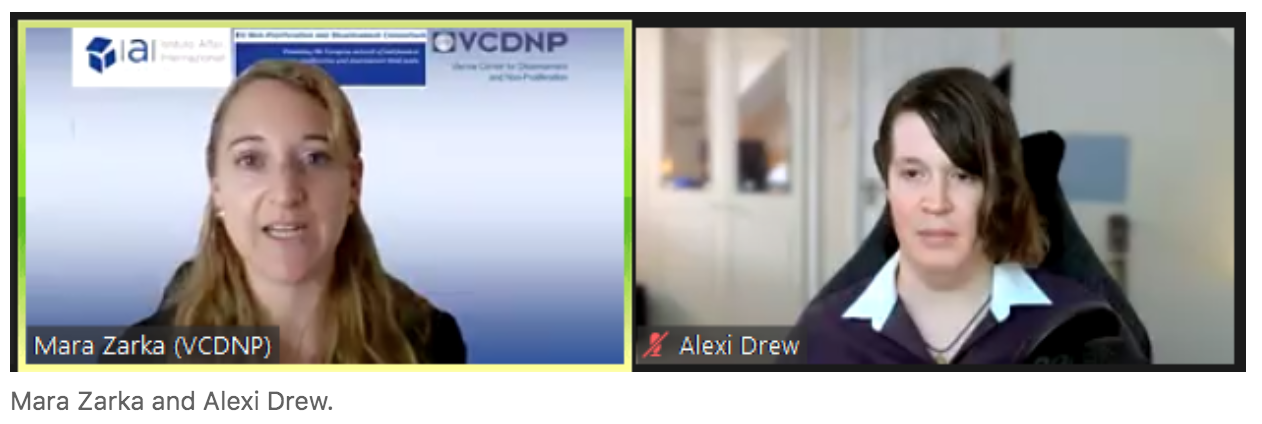 Another crucial and often underestimated aspect of cyber security has to do with supply chains that contribute to creating broader attack surfaces, linking private and public digital infrastructures. However, as Dr. Drew explained, not everything that takes place in the cyber space can or should be considered as a form of warfare. In the large majority of cases, it is about cyber espionage, never intended to cause physical damage. This difference is widespread and yet difficult to explain, since it is incidents such as the one that happened at the Natanz nuclear plant – actually intended to cause physical damage – that make the headlines. The consequent general failure in grasping these nuances between espionage and attacks remains one of the main barriers to effective policymaking on cybersecurity. The key of the instability risk that should be addressed by cybersecurity is indeed the possibility of escalation due to lack of knowledge, resulting from a deliberate policy on the side of both States and institutions involved in a cyber event. For instance, NATO members have never defined the standard beyond which a cyber incident can be considered a full-fledged attack, thus expanding the deterrent potential. However, this makes it hard to establish where the line is and represents a critical risk of escalation or “splash effect.” Dr. Drew concluded her remarks noting that cyber capabilities are rapidly proliferating, both in terms of defence and attack capabilities.
Another crucial and often underestimated aspect of cyber security has to do with supply chains that contribute to creating broader attack surfaces, linking private and public digital infrastructures. However, as Dr. Drew explained, not everything that takes place in the cyber space can or should be considered as a form of warfare. In the large majority of cases, it is about cyber espionage, never intended to cause physical damage. This difference is widespread and yet difficult to explain, since it is incidents such as the one that happened at the Natanz nuclear plant – actually intended to cause physical damage – that make the headlines. The consequent general failure in grasping these nuances between espionage and attacks remains one of the main barriers to effective policymaking on cybersecurity. The key of the instability risk that should be addressed by cybersecurity is indeed the possibility of escalation due to lack of knowledge, resulting from a deliberate policy on the side of both States and institutions involved in a cyber event. For instance, NATO members have never defined the standard beyond which a cyber incident can be considered a full-fledged attack, thus expanding the deterrent potential. However, this makes it hard to establish where the line is and represents a critical risk of escalation or “splash effect.” Dr. Drew concluded her remarks noting that cyber capabilities are rapidly proliferating, both in terms of defence and attack capabilities.
Networking session
During this session, participants were divided in groups and provided with ice-breaking questions. The discussion in the different groups covered both the main pressing challenges to non-proliferation and disarmament as well as ways in which the EUNPDC and its members could do to better engage the next generation and young women in the field.READ TAKEAWAYS FROM THE NETWORKING SESSION
Non-Proliferation, Arms Control and Disarmament: Changes in the Field and Career Tracks
The Initiative encourages young women and the next generation to enter the non‑proliferation, arms control, and disarmament field, especially at a time in which the global pandemic has isolated many young people who may find themselves lacking resources and assistance.
Find out more »